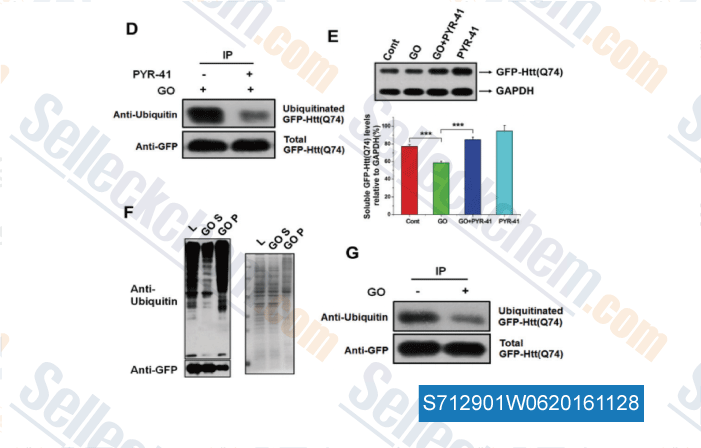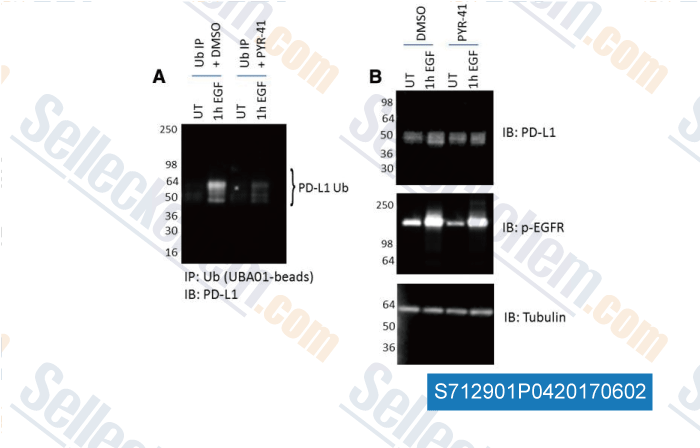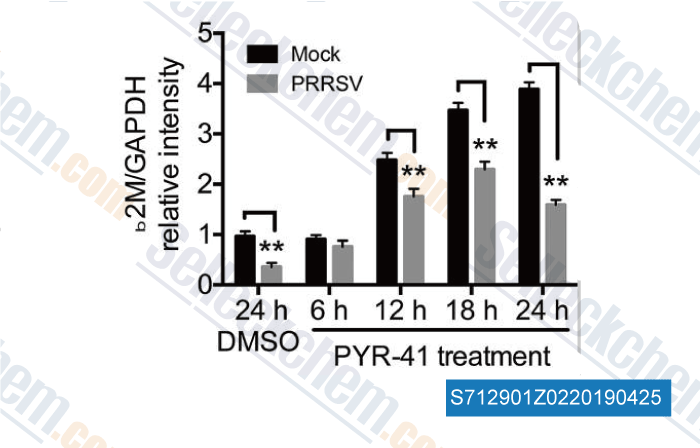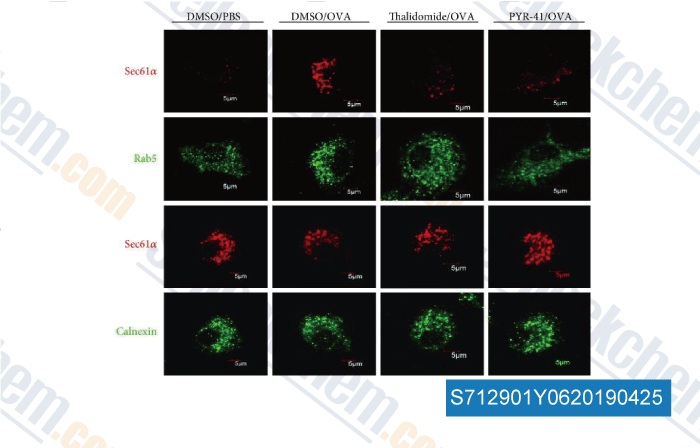|
Toll Free: (877) 796-6397 -- USA and Canada only -- |
Fax: +1-832-582-8590 Orders: +1-832-582-8158 |
Tech Support: +1-832-582-8158 Ext:3 Please provide your Order Number in the email. |
Technical Data
| Formula | C17H13N3O7 |
|||
| Molecular Weight | 371.3 | CAS No. | 418805-02-4 | |
| Solubility (25°C)* | In vitro | DMSO | 74 mg/mL (199.29 mM) | |
| Water | Insoluble | |||
| Ethanol | Insoluble | |||
|
* <1 mg/ml means slightly soluble or insoluble. * Please note that Selleck tests the solubility of all compounds in-house, and the actual solubility may differ slightly from published values. This is normal and is due to slight batch-to-batch variations. * Room temperature shipping (Stability testing shows this product can be shipped without any cooling measures.) |
||||
Preparing Stock Solutions
Biological Activity
| Description | PYR-41 is the first cell-permeable inhibitor of ubiquitin-activating enzyme E1, with no activity at E2. PYR-41 induce apoptosis. | ||
|---|---|---|---|
| Targets |
|
||
| In vitro | PYR-41 (50 μM) inhibits activity of ubiquitin-activating enzyme E1 by over 90%. PYR-41 could be a target for nucleophilic attack and potentially reacts with the active site cysteine of E1. PYR-41 efficiently blocks cyclin E degradation. PYR-41 decreases the level of E1fUb thioesters in cells with a IC50 of between 10 and 25 μM, and prevents proteasome inhibitor–induced accumulation of ubiquitylated proteins. PYR-41 increases total sumoylation in cells and in cell harboring temperature-sensitive E1. PYR-41 is able to inhibit both proteasome-dependent and proteasome-independent activities of ubiquitylation. PYR-41 (50 μM) attenuates 1 ng/mL IL-1α-mediated nuclear factor-κB activation by >60% through preventing the downstream ubiquitylation and proteasomal degradation of IκBα. PYR-41 inhibits degradation of p53 and activates the transcriptional activity of p53, which enable its differentially killing transformed p53-expressing cells. [1] PYR-41 blocks ubiquitination reactions but paradoxically leads to the accumulation of high MW ubiquitinated proteins. PYR-41 also has equal or greater inhibitory activity against several deubiquitinases (DUBs) in intact cells and purified USP5 in vitro. PYR-41 also mediates cross-linking of specific protein kinases (Bcr-Abl, Jak2) to inhibit their signaling activity. [1] |
Protocol (from reference)
References
|
Customer Product Validation

-
Data from [Data independently produced by , , Nanoscale, 2016, 8: 18740-18750]

-
Data from [Data independently produced by , , Neoplasia, 2017, 19(4):346-353]

-
Data from [Data independently produced by , , J Virol, 2017, 91(5)]

-
Data from [Data independently produced by , , J Immunol Res, 2018, 2018:5070573]
Selleck's PYR-41 has been cited by 34 publications
| Glutathione reductase underlies the stability of mutant p53 by antagonizing protein glutathionylation [ Redox Biol, 2025, 81:103522] | PubMed: 39983342 |
| Engineered a dual-targeting HA-TPP/A nanoparticle for combination therapy against KRAS-TP53 co-mutation in gastrointestinal cancers [ Bioact Mater, 2024, 32:277-291] | PubMed: 37876556 |
| ER Stress-Activated HSF1 Governs Cancer Cell Resistance to USP7 Inhibitor-Based Chemotherapy through the PERK Pathway [ Int J Mol Sci, 2024, 25(5)2768] | PubMed: 38474017 |
| IE1 of Human Cytomegalovirus Inhibits Necroptotic Cell Death via Direct and Indirect Modulation of the Necrosome Complex [ Viruses, 2024, 16(2)290] | PubMed: 38400065 |
| Precise pancreatic cancer therapy through targeted degradation of mutant p53 protein by cerium oxide nanoparticles [ J Nanobiotechnology, 2023, 21(1):117] | PubMed: 37005668 |
| The Ubiquitin-Proteasome System Facilitates Membrane Fusion and Uncoating during Coronavirus Entry [ Viruses, 2023, 15(10)2001] | PubMed: 37896778 |
| The Ubiquitin-Proteasome System Facilitates Membrane Fusion and Uncoating during Coronavirus Entry [ Viruses, 2023, 15(10)2001] | PubMed: 37896778 |
| Proteasomal and autophagy-mediated degradation of mutp53 proteins through mitochondria-targeting aggregation-induced-emission materials [ Acta Biomater, 2022, S1742-7061(22)00458-5] | PubMed: 35931280 |
| Small Molecules Promote Selective Denaturation and Degradation of Tubulin Heterodimers through a Low-Barrier Hydrogen Bond [ J Med Chem, 2022, 65(13):9159-9173] | PubMed: 35762925 |
| TRIP13 modulates protein deubiquitination and accelerates tumor development and progression of B-cell malignancies [ J Clin Invest, 2021, 146893] | PubMed: 34061780 |
RETURN POLICY
Selleck Chemical’s Unconditional Return Policy ensures a smooth online shopping experience for our customers. If you are in any way unsatisfied with your purchase, you may return any item(s) within 7 days of receiving it. In the event of product quality issues, either protocol related or product related problems, you may return any item(s) within 365 days from the original purchase date. Please follow the instructions below when returning products.
SHIPPING AND STORAGE
Selleck products are transported at room temperature. If you receive the product at room temperature, please rest assured, the Selleck Quality Inspection Department has conducted experiments to verify that the normal temperature placement of one month will not affect the biological activity of powder products. After collecting, please store the product according to the requirements described in the datasheet. Most Selleck products are stable under the recommended conditions.
NOT FOR HUMAN, VETERINARY DIAGNOSTIC OR THERAPEUTIC USE.
